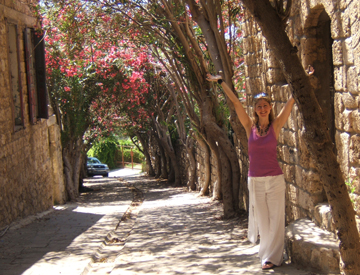By Kate Helm
As manager of an assessment of environmental threats in Russia, Sarah Lowery ’02 focused on the country’s slow progress in energy efficiency and its vulnerability to climate change. She wrote the report’s biodiversity chapter. She has also analyzed energy sectors in four nations for clean energy proposals for the U.S. Agency for International Development.
As a senior associate at the international development firm ECODIT LLC, based in Washington, D.C., Lowery manages the firm’s environmental projects.
“I am passionate about environmentally sustainable economic development,” says Lowery, who earned an MBA from Yale School of Management and a master’s degree in environmental management from Yale School of Forestry and Environmental Studies in 2010. “I want to enable people in developing countries to provide for their families and to conserve valuable natural resources, which will sustain development in the long term.”
A career in environmental protection is a far cry from her original goal of making millions as a stockbroker—a plan diverted when she saw how applied economics can be used to improve the lives of the poor through an EXCEL Scholars project as a Lafayette student.
Lowery collaborated with Gladstone Hutchinson, associate professor of economics, to document examples of applied non-Keynesian economic theory and to analyze public expenditures of the Jamaican government. In April 2001, she and Harsh Agrawal ’01 traveled to Jamaica with Hutchinson to present their research to senior government officials.
Because of her collaboration with her faculty mentor, she imagined greater possibilities for her future.
“Dr. Hutchinson inspired me, challenged me, and believed in me, and thus, I believed in myself,” she says. “He really had a profound impact on me, both professionally and personally.”
Lowery, who majored in economics & business and Japanese studies, also studied abroad in Australia and went to China and Japan as a Marquis Scholar. “My time at Lafayette opened up a world of possibilities, especially to travel,” she says.

Sarah Lowery ’02 in Belize
So, upon graduation, Lowery headed to Belize as a Peace Corps volunteer.
While there, she worked with the Belize Audubon Society, which managed a protected area near her village. She collaborated with the organization on outreach programs that trained villagers to be tour guides, which increased their incomes and reduced the need to poach plants and animals from the park.
“[That was when] I realized my interest and passion for environmental conservation could actually be a career,” says Lowery.
“I saw that economic development needed to take into account environmental concerns and, perhaps more important, that development and conservation goals are not mutually exclusive,” she says. “For example, ecotourism is a great way to increase income for local people and conserve the environment, if it’s done right.”
The Peace Corps also required her to expand her personal boundaries.
For example, when Lowery first arrived in Belize, she was uncomfortable speaking Spanish. So she made a conscious effort to interact and speak in Spanish with local villagers. She now is fluent in the language.
“At first, I didn’t know what to talk about. I had to force myself to make small talk about the weather or food,” she says. “I made friends by asking people to teach me how to make Belizean dishes. Once quite shy, I became more outgoing and comfortable talking to almost anyone.”
Her social lessons paid huge dividends, not only for Lowery but also for the people of that country.
Modeling the mentoring relationship she found with Hutchinson, Lowery showed the young women in Belize a path to greater possibilities. For example, by helping one woman improve her computer and typing skills, Lowery aided her in obtaining a highly coveted government job. She also tutored another girl who wanted to be a nurse in science.
Lowery believes that it was the gift of her time—more than her knowledge—that made the real difference for these women.
“My presence as an educated, unmarried female who had the time to help these women was one of the most important things I could give them—a different example of who they could be,” she says. “I showed them that they could choose to pursue education, for example, instead of, or in addition to, a family.”

1 Comment
Sarah, please join our organization! We are a group of RPCVs and other volunteers who served in Belize. Check out our website for more information. Thanks!
Comments are closed.